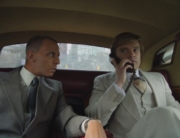The Mercy depicts the true story of Donald Crowhurst (Colin Firth), an amateur sailboat enthusiast who enters a contest to sail around the world in 1968 using a sailboat of his own design. Leaving his family behind, he encounters setback after setback before slowly losing his mind.
An inventor with some significant money troubles, Crowhurst attempts to sell a nautical tool at a trade show, but he isn’t meeting with much success, so when the London Times offers a cash prize to the person who can sail solo around the world the fastest without touching land, Crowhurst sees this as an opportunity to save his failing business. The first third chronicles the lead up to the voyage, and it is bright and bubbly. Crowhurst hires press agent Rodney Hallworth (David Thewlis) and manages to finagle some seed money from investor Stanley Best (Ken Stott). There follows a whirlwind of shots chronicling Hallworth drumming up enthusiasm and Crowhurst quoting aphorisms like “Because to only do what has been done before is to live one’s life in the shadow of other men” and ““Dreams are the seeds of action, we’d all do well to remember that.” He also has his three children excited about this adventure to the consternation of his supportive but doubtful wife, Clare (Rachel Weisz).
Eventually though, cracks appear in Crowhurst’s plan. The building of the boat and obtaining provisions are straining his finances, and necessary parts aren’t ordered in time. To meet a deadline, he invents a necessary part but signs a contract giving away the rights to his invention as well as the deed to his home if he doesn’t complete the run. Before you say, “Well, that must be a fabrication, because it creates a too-perfect incentive,” he did indeed stake his house on this project. It was all or nothing. Director James Marsh (The Theory of Everything, Man on Wire) models this section on the many underdog feel-good sports movies produced since film began. He and Firth give Crowhurst a peppy (not too peppy, please, we’re British) verve and drive that allows you to skate over the cracks in the ice of Crowhurst’s plan.
As the day of the launch arrives, John Johansson’s enigmatic score drops out of sight, and all we hear are the waves lapping up to the docks, birds squalling, and the groaning of boats rocking upon the waters on a dull, dour November morning. It’s not a subtle foreshadowing, but it’s effective. Crowhurst takes off, and the rhythm of the film switches back-and-forth between the press frenzy in England, excited because of the reported speed of Crowhurst’s journey, and his quiet angst as he slowly realizes he’s over his head, so much so that he fabricates his progress. He is, in fact, well behind anyone else. One by one, sailors drop out until there are only two left.
There are quite a few themes Marsh and screenwriter Scott Z. Burns try to keep spinning in the air: the fragility of the aura of amateurism in the face of reality, the particularly British style of stiff upper lip optimism, the craven ravenous of the press, and, of course, man against nature and his miniscule place in an awe-inspiring universe. They hit their marks relatively well, albeit in a muted, detached sort of way.
The real issues with the film are two-fold. One, the story gets muddled about halfway through. The film is not very clear on why Crowhurst is fabricating locations or pulling the sails down as opposed to continuing the race. Eventually, you catch on, but usually about 10 minutes after the fact. Since this isn’t a mystery, and you really need to know what’s going on in real time, it’s a pretty solid concern.
The second and more serious issue is that Crowhurst remains an enigma. We never get inside his head. Firth gives a subtle, committed performance, and there’s no one better at the portraying the crumbling resolve of British reserve, but he doesn’t crack this nut. It’s all a little too internal—realistic, possibly, but not something an audience can latch onto. Burns’s script and Marsh’s direction don’t help much, particularly in the latter half as Crowhurst starts losing his grip on reality. Marsh piles on unnerving sound effects and imagery to counter the morose Crowhurst’s relative inactivity but to little avail.
Weisz also gets a bit of short thrift. She is stuck portraying the sympathetic, supportive wife with little variation or variety available to her. She stands by her man, which is all well and good, but he has abandoned her to face potential financial destitute. He is no longer drawing a salary, and there’s a scene where Weisz has to ask for (gasp) public assistance. We can’t really tell how Weisz feels about that. She has a good Oscar-baity monologue, and Weisz’s charm and skill go a long way to fleshing Clare Crowhurst out, but it’s a bit of a lost cause. It’s just not a well-written character.
Visually, the film goes down easy, and the late Johan Johansson’s evocative score is among his best, but ultimately we learn little about Crowhurst and why he undertook this dangerous journey.







Leave A Comment